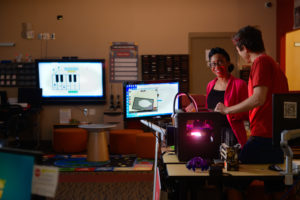Learning Design and Technology draws upon the fields of education, psychology, communications, and design to improve human performance and knowledge in all learning environments, particularly educational institutions and the workplace. It serves students who are interested in working in multiple sectors as instructional designers and developers rather than teachers. This concentration does not lead to licensure like most undergraduate programs in the College of Education. Rather, graduates would be expected to work as instructional designers and content developers for different employers such as K-12 and private school systems, higher education institutions, government/military agencies, or business/industry. Some graduates may also be interested in entrepreneurial work, creating non-profits or startup companies to offer technical educational services, training, or new products.
Graduate will understand how to design, produce, and evaluate effective educational materials in varied formats such as software, apps, e-learning modules, online courses and curricula, games and simulations, VR/AR experiences, locative/spatial media, and more.
Students are encouraged to obtain their B.S. in EGS-LDT and their M.Ed. in LDT to best position themselves for career opportunities that are more prevalent for graduates with a master’s degree.
Courses include: School & Society, Educational Psychology, Developmental Psychology, Intro. to Instructional Technology, Emerging Technology for Teaching & Learning, Teaching and Learning with Digital Video, Design and Evaluation of Instructional Materials
Learn More About Careers: According to a recent O*Net career opportunity report, the field for instructional designers and technologists has a faster than average growth rate at 10 to 14% annually through 2026, and North Carolina is projected to add 70 annual jobs in their areas with an 11% growth rate. The noted median wages of $63,750 are attractive within the education sector. Prospective students interested in career opportunities in this sector can search on LinkedIn, government, and the Chronicle of Higher Education job boards for “instructional designer” or “curriculum” opportunities to see the variety of jobs available to graduates.
| College | |
| Discipline |
|
| Academic Department |
|
| Departmental Contact | |
| Major Overview | |
| Plan Requirements | |
| Semester Sequence | |
| Related Majors | |
| Skills You Could Develop |
|
| Learn More About This Major |
|
| Career Titles |
|
| Learn More About Careers |
